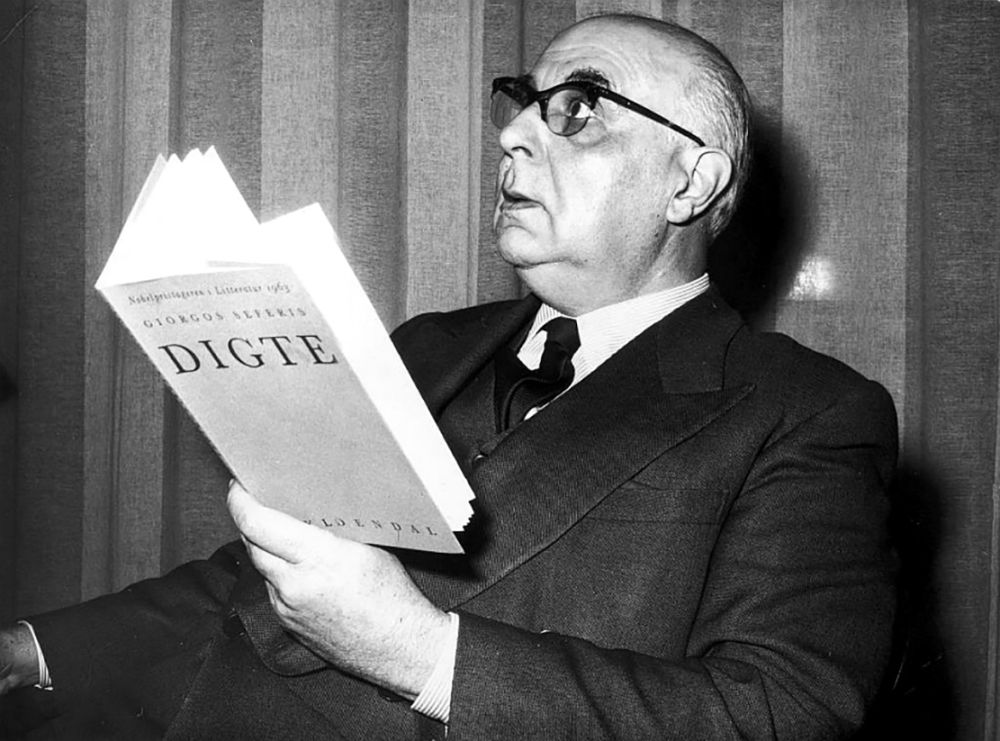Issue 50, Fall 1970

Seferis was nearing the end of his longest visit to the United States at the time of this interview, which took place in late December of 1968. He had just completed a three-month term as fellow of the Institute for Advanced Study in Princeton, and he was in particularly good spirits because he felt that his visit had served for a kind of rejuvenation: an interlude free from the political tensions that had been building up for some months in Athens and the occasion for both reflection and performance. The latter included a series of readings—at Harvard, Princeton, Rutgers, Pittsburgh, Washington, D.C., and the YMHA Poetry Center in New York—Seferis reading in Greek and the interviewer in English, each appearance with its distinct qualities of excitement and response. In Pittsburgh, for example, the audience (composed mostly of local Greek-Americans) seemed bewildered by the poetry during the reading but responded to the poet during the reception afterward as they might to Greece’s exiled king. The New York reading began with an introduction by Senator Eugene McCarthy. During the discussion period several questions from the audience had to do specifically with the political situation in Greece. Seferis refused to answer them. He was thought to be evasive by some in the audience, but he held his ground, and during the dinner following the reading he gave his reasons in private: He didn’t consider it proper to criticize his government while a guest on foreign soil, safely outside the boundaries of the government’s displeasure. He saved his answers for his return to Greece: an uncompromising statement against the dictatorship presented to local and foreign correspondents in defiance of martial law and at obvious personal risk (The New York Times, March 29, 1969).
The combination of diplomatic tact and high conscience that defines the political character of Seferis also colors his presence and personal style. He is a heavy man, his voice gentle when disengaged, his movements slow, almost lethargic at times; yet he has a habit of gripping your arm as he moves, and the grip, though amiable in the old-fashioned European manner, remains young and firm enough to give you word of the strength still in him. And the voice has a second edge that cuts sharply when he senses something dubious or facile challenging it. Then, on the diplomatic side again, comes a sense of humor: a love of nonsense, of the risqué joke, of kidding himself and others with a wry little moon of a smile that appears unexpectedly in his oval face—especially after he’s trapped his listener with the question: “Why are you laughing?” An American poet once referred to him as a “Middle-Eastern troglodyte” in a poem about his first reading in New York some years ago. When the interviewer finally got up the courage to show him the poem, Seferis fixed him with a sharp, uncompromising look. “Middle-Eastern troglodyte. Ridiculous and inaccurate. I once called myself a Cappadocian troglodyte, and that is what I plan to remain. Why are you laughing?” Then the smile.
The interview took place in the Seferis temporary home at the Institute for Advanced Study, an unpretentious second-floor apartment with three rooms, with a large window overlooking the grounds, the bookcase almost empty, none of the modern Greek paintings and classical treasures that set the style of the Seferis home in Athens. Yet the poet was delighted with the place because it gave him access to a number of exotic things: changing trees, and squirrels, and children crossing the lawn from school. His wife Maro—hair still gold and braided like a girl’s—was present throughout the interview, sometimes listening with apparent amusement, sometimes preparing food or drinks in the background. There were three recording sessions. Seferis would take a while to warm up with the microphone watching him from the coffee table, but whenever he began to reminisce about friends from the war years and before—Henry Miller, Durrell, Katsimbalis—or the years of his childhood, he would relax into his natural style and talk easily until the tape died out on him.
INTERVIEWER
Let me start by asking you about the Institute for Advanced Study and how you feel, only recently retired from the diplomatic service, about beginning a new career as a student.
GEORGE SEFERIS
My dear, the problem which puzzles me is: What is advanced study? Should one try to forget, or to learn more, when one is at my stage of advanced study? Now I must say, on a more prosaic level, that I enjoy very much the whole situation here because there are very nice people, very good friends, and I enjoy—how shall I put it?—their horizons. There are many horizons around me: science, history, archaeology, theology, philosophy . . .
INTERVIEWER
But don’t you feel out of place among so many scientists? So many historians?
SEFERIS
No, because I am attracted by people whose interests are not in my own area.
INTERVIEWER
Do you think there’s an advantage—as I think Cavafy would probably have thought—to being in dialogue with historians? In other words, do you feel that history has something particular to say to the poet?
SEFERIS
If you remember, Cavafy was proud of having a sense of history. He used to say: “I am a man of history”—something like that, I don’t remember the exact quotation. I am not that way; but still, I feel the pressure of history. In another way, perhaps: more mythological, more abstract, or more concrete . . . I don’t know.
INTERVIEWER
How about the relation of the Greek poet to his particular historical tradition? You once said that there is no ancient Greece in Greece. What did you mean by that exactly?
SEFERIS
I meant Greece is a continuous process. In English the expression “ancient Greece” includes the meaning of “finished,” whereas for us Greece goes on living, for better or for worse; it is in life, has not expired yet. That is a fact. One can make the same argument when one discusses the pronunciation of ancient Greek. Your scholars in America or in England or in France may be quite right in adopting the Erasmic pronunciation: for them Greek is a dead language; but for us it is another story. The fact is, you consider that ancient Greek has terminated its function at a certain point, and this enables you to pronounce it—with my regrets—in an arbitrary way.
INTERVIEWER
Then you obviously see the Greek tradition in language, as well as in other things, as a continuous process. That is not the belief of some classical and Byzantine scholars in this country—and, I suppose, elsewhere.
SEFERIS
You know why that happens? Because the subject, the history, of Greece is so large that each scholar limits himself to a certain period or branch, and nothing exists outside of it. For example, Gibbon considered that a thousand years of life were a decline. How can a people be in decline for a thousand years? After all, between the Homeric poems and the birth of Christ eight hundred years elapsed—or something like that—and then presumably there were a thousand years of decline.
INTERVIEWER
On the question of the Greek poet’s relation to his tradition, it has always seemed to me that the Greek poet has an advantage over his Anglo-Saxon counterpart who makes use of Greek mythology and sometimes even of Greek landscape. I remember years ago when I was writing a thesis on what I thought were English influences in the poetry of Cavafy and Seferis, I asked you about certain images that crop up in your landscape, for example, the symbolic meaning of the statues that appear in your work. You turned to me and said: “But those are real statues. They existed in a landscape I had seen.” What I think you were saying is that you always start with the fact of a living, actual setting and move from there to any universal meaning that might be contained in it.
SEFERIS
An illustration of that from someone who is a specialist in classical statues came the other day from an English scholar who was lecturing about the statuary of the Parthenon. I went up to congratulate him after his lecture, and he said to me, as I remember: “But you have a line which expresses something of what I meant when you say ‘the statues are not the ruins—we are the ruins.’” I mean I was astonished that a scholar of his caliber was using a line from me to illustrate a point.
INTERVIEWER
The imagery that a poet gets from his childhood is something we’ve discussed before. You once distinguished yourself from the average Englishman by suggesting that donkeys probably did for you what footballs and cars might do for them. I remember you also talked about the sea and the sailors of your native village near Smyrna.
SEFERIS
You know, the strange thing about imagery is that a great deal of it is subconscious, and sometimes it appears in a poem, and nobody knows wherefrom this emerged. But it is rooted, I am certain, in the poet’s subconscious life, often of his childhood, and that’s why I think it is decisive for a poet: the childhood that he has lived.
I think there are two different things functioning: conscious and subconscious memory. I think the way of poetry is to draw from the subconscious. It is not the way you write your memoirs, let’s say, or the way you try to remember your past, your early life. I remember many things from my childhood which did impress me. For instance, when I was a child I discovered somewhere in a corner of a sort of bungalow we had in my grandmother’s garden—at the place where we used to spend our summers—I discovered a compass from a ship which, as I learned afterwards, belonged to my grandfather. And that strange instrument—I think I destroyed it in the end by examining and re-examining it, taking it apart and putting it back together and then taking it apart again—became something mythical for me. Or again, when autumn approached, when there would be a rather strong wind, and the fishing barges would have to sail through rough weather, we would always be glad when they were at last anchored, and my mother would say to someone among the fishermen who’d gone out: “Ah, bravo, you’ve come through rough weather”; and he would answer: “Madam, you know, we always sail with Charon at our side.” That’s moving to me. Perhaps when I wrote about Ulysses in that early poem you’ve commented on [“Upon a Foreign Verse”]—perhaps I had in mind somebody like that fisherman. Those “certain old sailors from my childhood” who would recite the Erotokritos. In any case, I think it is always a bit dangerous to make unconscious images conscious, to bring them out into the light, because, you know, they dry out immediately.




